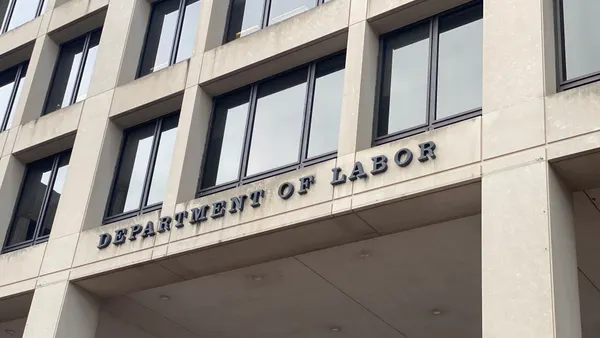Dive Brief:
- Starbucks has agreed to pay $176,000 and provide better oversight to settle a multi-year investigation into a policy that made New York City employees find replacements to cover for them when they called out sick, the city's mayor announced Dec. 19.
- The coffee chain will set up a $150,000 fund set up by a third-party claims administrator to cover current and former employees who worked in New York City Starbucks locations from Jan. 1, 2015 to Dec. 31, 2016, who were required to find a replacement. It will pay the remaining $26,000 to the Department of Consumer and Worker Protection to be distributed to 23 workers who were identified during the administration.
- The settlement also requires the coffee chain to post education posters about the city’s sick leave policy in all New York City stores, to provide plain language information on its sick leave policy to more than 8,000 employees in the city and follow up within six months describing its compliance to city regulators. The agreement will run for at least three years.
Dive Insight:
Not long after New York City started to investigate Starbucks' sick leave policy, the company revised its standard nationwide, allowing employees to accrue one hour of sick leave for every 30 hours worked. That sick leave can also be used to care for a family member.
New York City, in general, has been particularly labor-friendly; it recently sued Chipotle, for example, alleging the employer violated the city’s Fair Workweek Law by not providing schedules at least two weeks in advance, adding that the fast casual chain also violated the city’s sick leave law by offering an inconsistent and confusing policy.
The Starbucks case originally stemmed from accusations that the chain violated the city's Earned Safe and Sick Time Act from April 2014 to February 2016 because it required employees to find someone to replace them before calling out sick, or face disciplinary action such as termination, according to Reuters. The city law requires employers with five or more employees working over 80 hours each calendar year to provide paid safe and sick leave.
Starbucks has been rethinking its offerings lately as well, enhancing its mental health benefits to offer six free visits to a mental health provider through its employee assistance program and adding surrogacy and intrauterine insemination reimbursement for procedures not covered by insurance to its Family Expansion Reimbursement program. Offering benefits like these and showing accountability when the company violates labor rules may be key to improving retention at a time when quick-service restaurants say they're facing an ongoing labor shortage.













